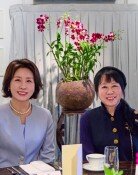Five Years After Adopting `Open Government Posts`
Five Years After Adopting `Open Government Posts`
Posted December. 06, 2005 06:47,
Are Open Government Posts a Means to Rehire Retired Officials?
According to data acquired from the Civil Service Commission on December 5, as of late October, out of the 139 open public posts, only 58, or 41.7 percent, have been filled by non-public servant civilians, while 58.3 percent of 81 posts were filled by former public servants.
In external figures, the number of former public servants filling open posts has fallen significantly when compared to the Kim Dae-jung government, where 87.9 percent of the posts were taken up by former government employees. However, out of the 58 classified as pure civilians, 13 held public jobs before being selected, so in reality, former government workers account for 67.6 percent, or 94 posts.
For example, Mr. K, who was appointed to the Ministry of Finance and Economy (MOFE) as an international affairs policy officer, actually worked as a MOFE public relations officer and quit from the ministry when he was sent to the Uri Party Expert Committee. He used this period as his private civilian qualification, applied for the open post, and returned to his home ministry.
Mr. C, who was appointed to the head of the Visual Media Agency under the Korea Overseas Information Service, in April, overcoming an 11-to-one competition, is classified as a private civilian, but he has worked for the Presidential Secretariat Public Relations division as an administrative official. Another example is Mr. S, appointed in July to head the Education Center for Unification. He was classified as another private civilian because of his career as a guest professor, but he is a typical government bureaucrat that has been appointed to key posts in the Ministry of Unification.
It has also been discovered that five out of three open posts in the Ministry of Defense, supposedly filled by civilians, were actually filled by senior officers that had retired recently.
The Ministry of Science and Technology, Ministry of Government Administration and Home Affairs, the Rural Development Administration, the Korea Forest Service, the Ministry of Labor, and the Ministry of Government Legislation have not hired any civilians at all.
Out of the civilians filling civil posts at these institutions, professors accounted for the most with 12, followed by eight lawyers, eight entrepreneurs and six researchers.
The Problem is the Wage Gap With the Private Sector
Experts view the open public servant posts as having positive effects in that the government bureaucracy adopts the efficiency of the private sector and activates competition.
Considering that 791 applied for the 139 posts, a six to one competition rate, the publics perception of the open posts is quite positive.
Nevertheless, it is a problem that many open posts are being filled with former government bureaucrats. The related officials explain that although competition is fierce, the wage gap within the private sector, and instability after contracts expire, make qualified private civilians refrain from applying, and hence, former government employees fill such spots.
An official of the Rural Development Administration, whose four open posts were all taken by insiders, commented, The posts are in unpopular fields, so there is no merit for private civilians to apply. Despite this, the qualification rigidly requires one to be at least a full university professor. What professor would apply for this?
Myongji University Public Administration Professor Park Chun-oh said, As one climbs to higher posts, the wage gap between government employees and private companies grows wider, hence it is difficult to pick outstanding people. The government should expand the recruiting for open posts to a larger audience, so young, capable, private experts will show more interest.
Kang-Myoung Chang taewon_ha@donga.com tesomiom@donga.com







